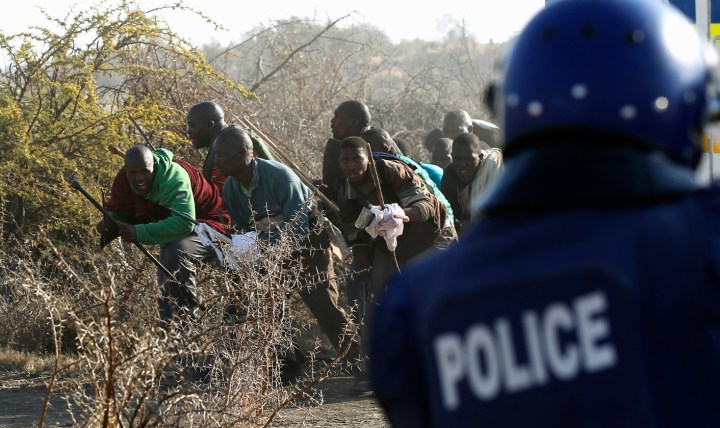South Africa
Marikana Commission: ‘Don’t single us out’ – police

The evidence team at the Marikana Commission of Inquiry suggested on Monday that the issues to be examined should be separated, with the conduct of the police on 16 August to be examined on its own. Advocate Ishmael Semenya of the police resisted vociferously, saying that they should not be singled out. A verdict will be announced on Thursday. By SIPHO HLONGWANE.
After crime scene expert Apollo Mohlaki concluded his testimony at the Marikana Commission of Inquiry on Monday, the evidence team suggested that instead of proceeding in a haphazard fashion, the issues should be separated so that the conduct of the South African Police Service (SAPS) on the 16th of August would be examined in isolation of the rest of the terms of reference. The logic was that there was an investigation into the police, and it was important that they knew as soon as possible if they would be held criminally liable or not.
Advocate Ishmael Semenya protested that the action would imperil his clients. The structure was legally impermissible, he argued, and unfair on the police.
“The [proposed] structure of the commission throws the spotlight on the police, without investigating Lonmin or the unions,” he said. “The conduct of Lonmin, AMCU and NUM is just as important to the Commission as is that of the police.”
The Commission’s terms of reference exclude the lawfulness of the police action on 16 August, Semenya said, and thus the commission did not have the power to investigate that. He said that he was also worried that the police would be brought into the matter of the deaths that happened before 13 August, in which they were definitely not implicated.
He continued: “No more than 100 police officers discharged their firearms on 16 August. If the commission investigates the lawfulness of police conduct, then we could have to call 100 witnesses.”
The isolation of SAPS would mean that the conduct of Lonmin prior to the inquiry would not be examined (the police have said that the massacre could have been avoided if Lonmin had negotiated with the workers), as well as the mental frame of the protesters at the time of the massacre, in reference to their alleged use of umuthi (potion), which the police will argue was the reason why they charged at them.
Semenya complained that the police have already been found guilty in the court of public opinion, with “wantonly made remarks also fuelled by counsel. Allegations of torture have been made without evidence.”
Lawyers arguing for the AMCU and the dead miners said that they supported the split. Dali Mpofu said that the Commission did indeed have the power to refer people for prosecution.
Reading from the terms of reference, he said: “The Commission shall where appropriate, refer any matter for prosecution, further investigation or the convening of a separate inquiry to the appropriate law enforcement agency, government department or regulator, regarding the conduct of any person or persons.”
He also said that it was now a matter of common cause that it was the police who caused the deaths of 34 people, the injury of 78 and the incarceration of a further 250 on that day. Since that concession had already been made, thus the business of the commission was now to establish whether or not that action was lawful or not.
“The police cannot claim self-defence and then say that the commission can’t rule on the lawfulness of its conduct,” Mpofu said.
In the opening statements made, it was only the police of all the parties singled out by the terms of reference (Lonmin, the police, NUM and AMCU) who admitted to being the cause of the deaths. The others absolved themselves and sought to place blame on other parties, primarily the police.
Semenya’s opposition to the commission’s proposal came after a day in which a case was made that the police had tampered with the crime scene on the day of the massacre to try and bolster their self-defence story.
In a nutshell, the police feel like they shouldn’t be going down alone on the issue of the deaths, but should be taking the company and the unions with them. At the same time, they are not even attempting to argue that anyone else directly caused the deaths by pointing loaded firearms at miners and discharging them. The issue of the lawfulness of that using maximum force on that day will most likely be the most important one to come out of this Commission.
Commission chairman Judge Ian Farlam said that intervention would be urgent if he were to find against a remilitarised police force that employed maximum force.
Farlam reserved ruling till Thursday. DM
Photo by Reuters

















